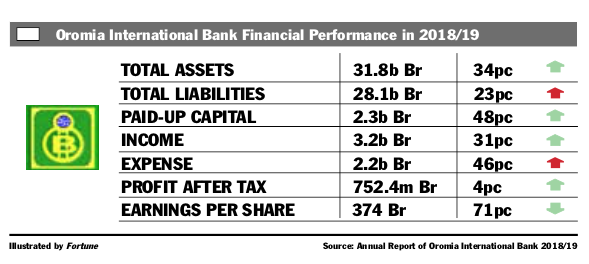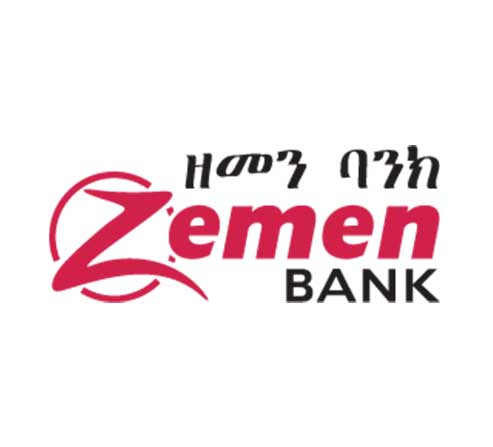
Fortune News | Dec 10,2018
Zemen Insurance, the latest entry in the insurance business, netted 18.3 million Br in profit during its first year of operations. The profit was mainly generated from investment activities.
With an original par value of 5,000 Br, the earnings per share (EPS) of the nation's 18th insurer also registered at 19.7pc. The company commenced full operations just 25 days ahead of the previous fiscal year's conclusion after securing its license from the National Bank of Ethiopia (NBE) in January of this year.
The firm had plans to commence operations early, according to Melaku Ezezew, the board chairperson of Zemen, which was founded by 942 shareholders and raised 81.5 million Br in paid-up capital from the subscribed capital of 114.6 million Br. Even though the establishment of the insurance company was initiated during the general assembly of Zemen Bank, the Bank did not invest in the insurance firm due to its investment policy prohibiting it from investing in companies that are less than three years old.
"Even though we planned to start operations early," said Melaku, "we had to start late due to the Novel Coronavirus (COVID-19) and instability around the country."
Shumetie Zerihun, the founding CEO of Zemen Insurance, says that the firm's management made a wise decision in keeping the money in banks to generate income until the firm started operations.
"We were getting between a 12.7pc and 13pc interest rate on time deposits," said Shumetie. "The rate was determined by a competitive bidding process."
From investment activities including interest on time deposits, saving accounts and government bonds, Zemen earned 20.2 million Br. It also gained an additional 5.7 million Br from other operating income, including service fees from the sale of shares and income from the recovery of bad debts. However, it registered no income from commission fees.
Zemen should keep on performing well in investment activities, according to Abdulmenan Mohammed, a financial statement analyst with two decades of experience.
Between February and early June, the firm's management had been focused on preparation activities. This involved organising human resources and re-charting procedures by working on policy manuals and insurance policies, revising feasibility studies, and designing a three-year strategic and operational plan.
"To control expenses," Shumetie said, "the organising committee's chairperson and I undertook all these activities."
Out of the Bank's net profit, the board of directors have proposed 15.1 million Br, or 82.5pc, be allocated as a dividend payout.
This level of dividend for a new entrant is awe-inspiring and delightful to its shareholders, according to Abdulmenan.
Hailegebriel Demeke, one of the founding shareholders, agrees with Abdulmenan's comment. He says that most new businesses operate with losses during their first months.
“I never expected a profit this year,” said Hailegebriel, who received a 16pc dividend during the past fiscal year. "Its performance was magnificent and even better than some [of the other] insurance companies."
Zemen managed to register 161,840 Br in gross premiums on the core insurance business largely from the business's marine and motor classes. It ceded 8,092 Br of the premiums to reinsurers, having a 95pc retention rate, which is much higher than the industry average of 77pc registered in 2019.
The firm registered 329,339 Br in underwriting losses during the year and paid just 641 Br in claims. Its underwriting expenses also stood at 335,104 Br.
Admitting that the firm did not perform well in the core insurance areas and considering its short existence in the business, Shumetie says the firm used the 25 days before starting the current fiscal year to look for clients.
"We were able to get new businesses," he said.
The operating and administrative expenses of Zemen stood at eight million Birr, of which 5.2 million Br was spent on the start-up establishment of the firm. The remainder was spent on general administration. Spending on employees’ salaries and benefits registered at 1.5 million Br.
Zemen’s total assets expanded fairly, registering 9.8pc growth to 122.2 million Br. Out of this, 76.8 million Br and 18 million Br were put into investments and leased assets, respectively.
The total liabilities of Zemen stood at 5.6 million Br before the end of the fiscal year, a decline of 68pc from the 17.4 million Br that was registered during the project period.
The firm’s paid-up capital also grew by 21.2pc to 98.8 million Br. The paid-up capital represents 80.9pc of its total assets.
"This indicates that Zemen has strong capital," said Abdulmenan. "It should use this capital efficiently."
During the general assembly held three weeks ago, the shareholders agreed to boost Zemen's paid-up capital to 150 million Br to strengthen its capacity and minimise the value of the business it sends to reinsurance companies, according to Shumetie.
"We're waiting for the approval from the central bank after sending the decision of the general assembly," he said.
Cash and bank balances of Zemen stand at close to eight million Birr. The ratio of cash and bank balances to total assets reached 6.5pc.
As Zemen is approaching the minimum liquidity level, it should take extra care to avoid a further reduction, according to Abdulmenan.
"Since we don't have liabilities," said Shumetie, "we're over-liquid."
PUBLISHED ON
Dec 26,2020 [ VOL
21 , NO
1078]

Fortune News | Dec 10,2018

Fortune News | Mar 14,2020

Fortune News | Jan 23,2021

Exclusive Interviews | Jan 05,2020

Radar | Aug 01,2020

Fortune News | Sep 10,2022

Radar | Nov 12,2022

News Analysis | Feb 03,2024

Radar | Apr 17,2021

Radar | Aug 25,2024

Dec 22 , 2024 . By TIZITA SHEWAFERAW
Charged with transforming colossal state-owned enterprises into modern and competitiv...

Aug 18 , 2024 . By AKSAH ITALO
Although predictable Yonas Zerihun's job in the ride-hailing service is not immune to...

Jul 28 , 2024 . By TIZITA SHEWAFERAW
Unhabitual, perhaps too many, Samuel Gebreyohannes, 38, used to occasionally enjoy a couple of beers at breakfast. However, he recently swit...

Jul 13 , 2024 . By AKSAH ITALO
Investors who rely on tractors, trucks, and field vehicles for commuting, transporting commodities, and f...

Oct 25 , 2025
The regulatory machinery is on overdrive. In only two years, no fewer than 35 new pro...

Oct 18 , 2025
The political establishment, notably the ruling party and its top brass, has become p...

Oct 11 , 2025
Ladislas Farago, a roving Associated Press (AP) correspondent, arrived in Ethiopia in...

Oct 4 , 2025
Eyob Tekalegn (PhD) had been in the Governor's chair for only weeks when, on Septembe...